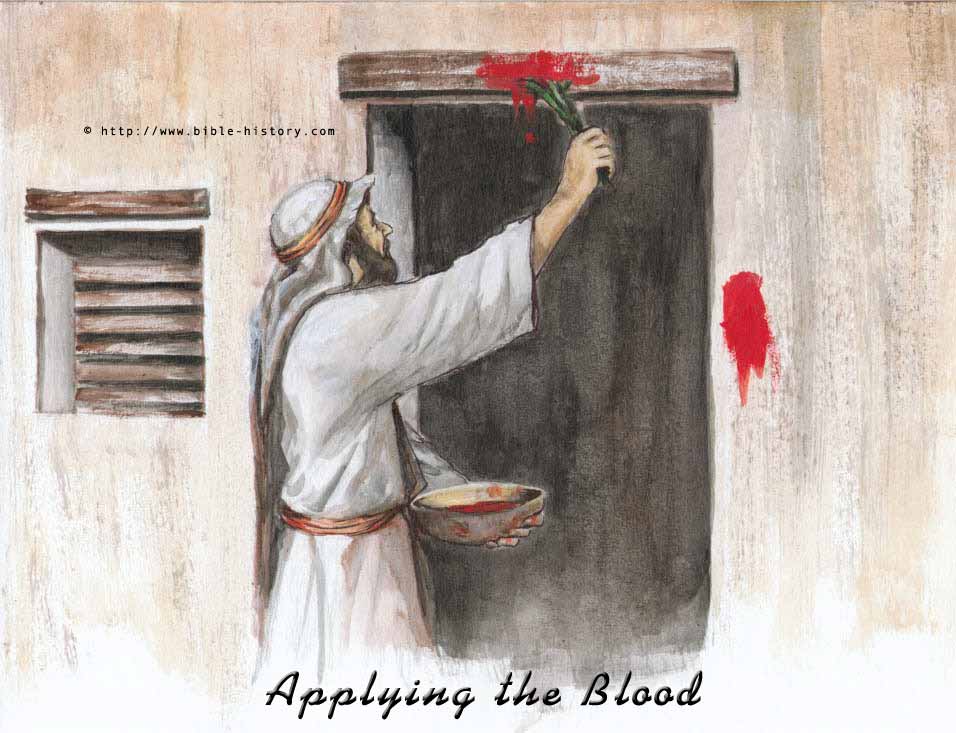29 The next day he saw Jesus coming toward him, and said, “Behold, the Lamb of God, who takes away the sin of the world! 30 This is he of whom I said, ‘After me comes a man who ranks before me, because he was before me.’ 31 I myself did not know him, but for this purpose I came baptizing with water, that he might be revealed to Israel.”
 Jesus is portrayed in the Gospel of John as the Passover Lamb. You may recall in the Hebrew Bible/Old Testament (Ex.12), in order for the angel of death to pass over the homes of believing Israelites families, the families needed to put a special sign on their doorposts – the blood of a lamb. The gospel of John pictures Jesus as the ultimate Lamb of God who not only symbolically covered the sins of Israelite households, but he actually took away the sin of the entire world (vs. 29).
Jesus is portrayed in the Gospel of John as the Passover Lamb. You may recall in the Hebrew Bible/Old Testament (Ex.12), in order for the angel of death to pass over the homes of believing Israelites families, the families needed to put a special sign on their doorposts – the blood of a lamb. The gospel of John pictures Jesus as the ultimate Lamb of God who not only symbolically covered the sins of Israelite households, but he actually took away the sin of the entire world (vs. 29).
A short side trip into church history will make it more interesting for us. In many predominantly Christian, countries, the festival of Easter was called by a different name. It was called the “Christian Passover.” Why? It’s simple. In the resurrection of Jesus Christ – the judgment of God passed over the sinner’s heads, just as it passed over the heads of the Israelites in their exodus from ancient Egypt. You see, all early Christians celebrated a festival that later came to be known as Easter. However, it used to be called Pascha (Easter in Syriac/Aramaic) or Peisach (Passover in Hebrew). Christian and Jewish leaders eventually worked to create and establish a clear separation between what became Christianity and Judaism. This process in spite of the popular opinion, took centuries and did not take place in the early second century as commonly thought.
Some Christians believed that Pascha (Christian Passover) had to be commemorated on the same date as the Jewish Passover while other Christians believed that Pascha should be celebrated on a different day than the Jewish Passover. The latter view won and the first view was eventually declared heretical.
Usually, Christians who held to the first view looked at Pascha as the day of Jesus’ sacrificial death. Others though believed that this holiday was meant instead to signify his resurrection. All of this is to say that while anti-Judaism in the early church did contribute to the date separation between Jewish and Christian Passovers, it was not the main factor. There were several other important considerations. Anti-Judaism, though present, was not the driving force behind the creation of a separate Christian identity and culture in the early centuries.
Important note: In the future posts we will discuss in detail the use of the technical term the “Passover of the Jews ” in this Gospel. It will be shown that the reason John’ keeps saying Passover of the Jews, is not to explain to Gentiles that it was a Jewish holiday, but to highlight which one of the various Israelite Passovers Jesus actually observed (most notably, Passover of the Jews vs. Passover of Samaritans).
To receive more information about learning Biblical Languages with Hebrew University of Jerusalem/eTeacher Biblical program online at affordable cost, please, click here.
© By Eli Lizorkin-Eyzenberg, Ph.D.
To sign up for weekly posts by Dr. Eli, please, click here. It is recommend by Dr. Eli that you read everything from the begining in his study of John. You can do so by clicking here – “Samaritan-Jewish Commentary”.





When is the Samaritans’ passover? Is it in the bible?
You can look it up on Google (dates) :-). It is in the Bible of course.
Shalom Dr Eli, thanks so much for your good works, i am an Africa Jew and i will like to learn more about the tallit
Dear Ken, I am sure that you can find a lot about “tallit” on the way. Go ahead and try google it up. Blessings, Dr. Eli